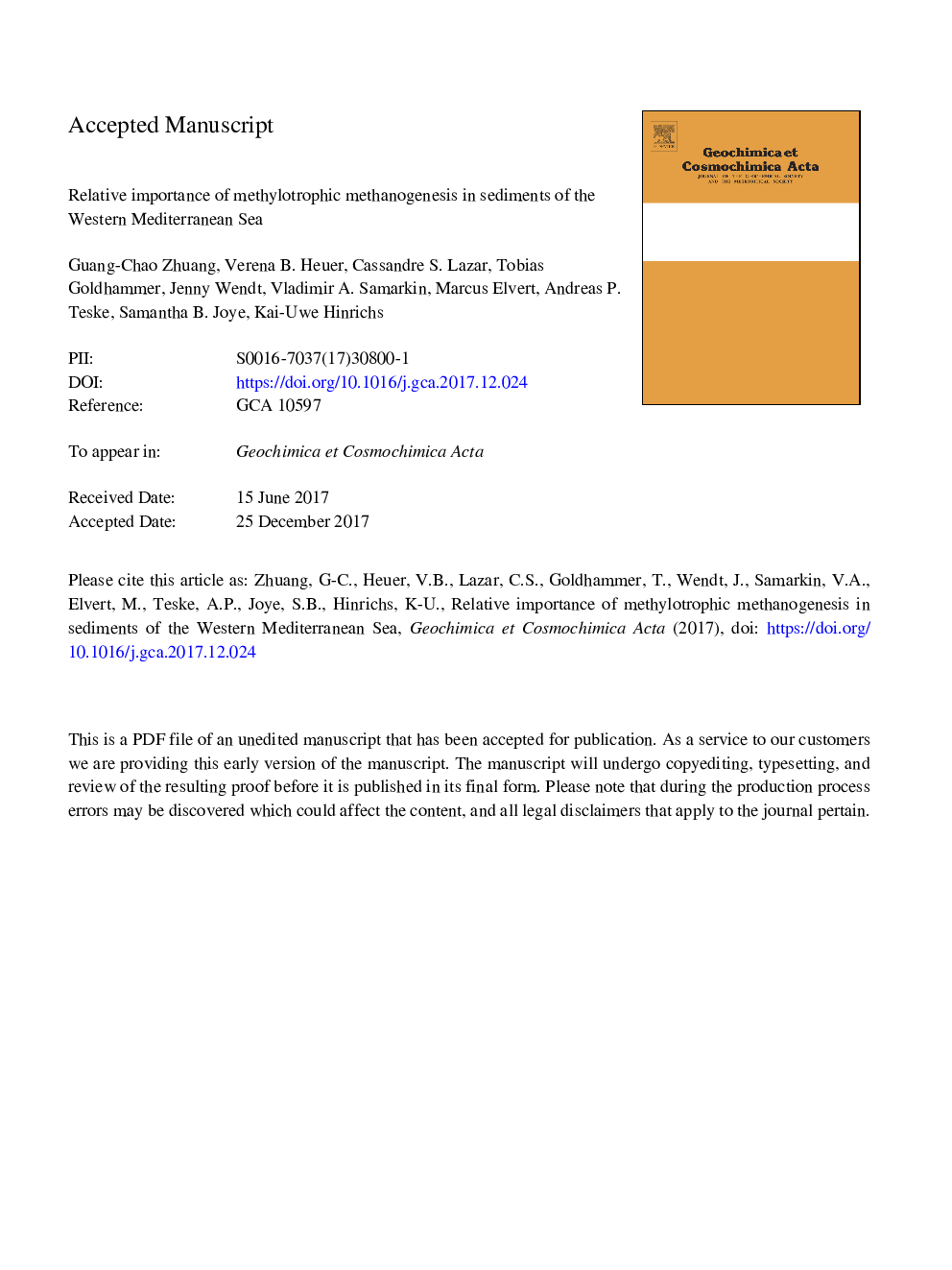| کد مقاله | کد نشریه | سال انتشار | مقاله انگلیسی | نسخه تمام متن |
|---|---|---|---|---|
| 8910871 | 1637933 | 2018 | 52 صفحه PDF | دانلود رایگان |
عنوان انگلیسی مقاله ISI
Relative importance of methylotrophic methanogenesis in sediments of the Western Mediterranean Sea
ترجمه فارسی عنوان
اهمیت نسبی متانوگنسیس متیلوتروفی در رسوبات دریای مدیترانه غربی
دانلود مقاله + سفارش ترجمه
دانلود مقاله ISI انگلیسی
رایگان برای ایرانیان
کلمات کلیدی
موضوعات مرتبط
مهندسی و علوم پایه
علوم زمین و سیارات
ژئوشیمی و پترولوژی
چکیده انگلیسی
Microbial production of methane is an important terminal metabolic process during organic matter degradation in marine sediments. It is generally acknowledged that hydrogenotrophic and acetoclastic methanogenesis constitute the dominant pathways of methane production; the importance of methanogenesis from methylated compounds remains poorly understood. We conducted various biogeochemical and molecular genetic analyses to characterize substrate availability, rates of methanogenesis, and methanogen community composition, and further evaluated the contribution of different substrates and pathways for methane production in deltaic surface and subsurface sediments of the Western Mediterranean Sea. Major substrates representing three methanogenic pathways, including H2, acetate, and methanol, trimethylamine (TMA), and dimethylsulfide (DMS), were detected in the pore waters and sediments, and exhibited variability over depth and between sites. In accompanying incubation experiments, methanogenesis rates from various 14C labeled substrates varied as well, suggesting that environmental factors, such as sulfate concentration and organic matter quality, could significantly influence the relative importance of individual pathway. In particular, methylotrophic and hydrogenotrophic methanogenesis contributed to the presence of micromolar methane concentrations in the sulfate reduction zone, with methanogenesis from methanol accounting for up to 98% of the total methane production in the topmost surface sediment. In the sulfate-depleted zone, hydrogenotrophic methanogenesis was the dominant methanogenic pathway (67-98%), and enhanced methane production from acetate was observed in organic-rich sediment (up to 31%). Methyl coenzyme M reductase gene (mcrA) analysis revealed that the composition of methanogenic communities was generally consistent with the distribution of methanogenic activity from different substrates. This study provides the first quantitative assessment of methylotrophic methanogenesis in marine sediments and has important implications for marine methane cycling. The occurrence of methylotrophic methanogenesis in surface sediments could fuel the anaerobic oxidation of methane (AOM) in the shallow sulfate reduction zone. Release of methane produced from methylotrophic methanogenesis could be a source of methane efflux to the water column, thus influencing the benthic methane budgets.
ناشر
Database: Elsevier - ScienceDirect (ساینس دایرکت)
Journal: Geochimica et Cosmochimica Acta - Volume 224, 1 March 2018, Pages 171-186
Journal: Geochimica et Cosmochimica Acta - Volume 224, 1 March 2018, Pages 171-186
نویسندگان
Guang-Chao Zhuang, Verena B. Heuer, Cassandre S. Lazar, Tobias Goldhammer, Jenny Wendt, Vladimir A. Samarkin, Marcus Elvert, Andreas P. Teske, Samantha B. Joye, Kai-Uwe Hinrichs,
